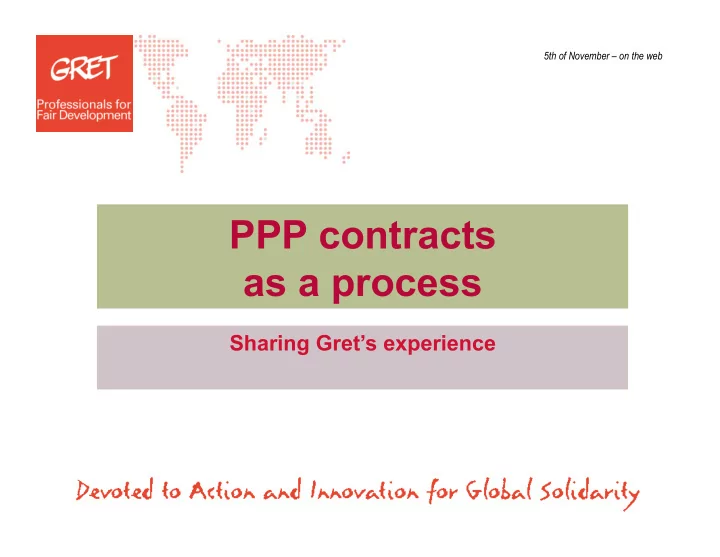

5th of November – on the web PPP contracts as a process Sharing Gret’s experience
Gret, Professionals for Fair Development A French development NGO 2 2 • Fighting poverty and inequalities • Providing sustainable, innovative solutions for fair development in the field • Promoting inclusive policies and development practices. Created in 1976 - 700 professionals Working in 30 countries 150 projects per year 30 publications per year A budget of 23 million euros
Where we are speaking from Gret’s 15 year experience on contracting 3 3 processes in the water sector emerges from • An early interest in grey zones: no longer rural, not quite urban (small towns, periurban areas) • Building policy and methodology references from local experiences • Formalising relationships between existing public and private stakeholders • Professionalising their work Our earliest work was in Cambodia, we now develop these approaches also in Laos, Madagascar, Mauritania and Senegal.
What is the issue? 4 4 (Beyond the obvious question: how to make services last?) • The grey zones are demographically fast growing • The demand in these areas is at least partially solvable and fast changing, it is diverse • Local domestic private providers are emerging, their role is being recognised and they are being encouraged to enter the sector What tools can be used to make sure their services are fair, affordable, lasting without stifling innovation and adaptability?
How can contracting help? 5 5 The contracting process is one of these tools It helps to: • Define needs • Set objectives • Clarify roles and responsibilities • Identify risks and benefits and allocate them • Consider checks and balances • Make service management accountable
The contract – a step, not the first one 6 6 The contract – as a document – is only the embodiment of a process, that is ongoing What is the Who are the What kind of local water main private demand? stakeholders ? operators? Defining and Reviewing the signing the contract contract
Estimating the water demand Estimating local demand is essential to: 7 7 • Understand existing water practices • Analyze water perceptions and expectations • Define acceptable management and financial solutions Some potential tools: Data from monitoring Socio-economic studies
Identifying the main stakeholders 8 8 Mapping existing stakeholders with the aim to • Identify different strategic groups and leaders (public figures, local officials, entrepreneurs, poor or vulnerable families, etc.) • Understand their specific positions, interests and relationships • Analyze the profiles of local entrepreneurs Some potential tools: Stakeholder meetings Local planning
Clarifying ownership? 9 9 • Mauritania: water Placing contracting services are a communal authorities in a position or state responsibility of responsibility is • Laos: district and essential provincial authorities are • The subsidiarity principle involved in contracting • Decentralisation • Madagascar: water processes are underway services are a in theory a across the world communal responsibility • The water sector is but there is a transitional sometimes devolved at phase levels closer to citizens
Choosing the operator: a key moment 10 10 Giving responsibility to the contracting authority at the lowest level • Technical assistance to local authorities • Selection committees that include local stakeholders Bidding processes that are within their reach • Training • Simple evaluation criteria • Adapted tools (templates, scoring cards, etc.) Promoting proximity (in Cambodia many water investors have a link to the sites they invest in…) And when the operator already exists? Negotiation is essential
Negotiation: who sits at the table? 11 11 Who sits at the negotiation table? Who are the stake- holders that the contract binds? • The operator • The local authorities • The sector authorities (at national level? At local level?)? • The users?
The perfect contract… 12 12 … does not exist! • The temptation to try to predict all possibilities and to add articles and clauses must be resisted, a contract is necessarily incomplete • It must be understood by all stake-holders (thus in a local language rather than an international one) • It serves to help the emergence of a common language on the water service • It spotlights major issues • It is better short, flexible, capable of change (through periodical contractual meetings)
Building trust A lasting service is one 13 13 where there is trust, and trust needs to be built. Building trust requires building understanding: • of the contract and it’s obligations • of the constraints each stakeholder faces • of the compromises reached
The contract must live 14 14 The relationship the In Laos contract embodies must • Yearly contract review live meeting is organised • It gathers the district, the • Contractual review concessionaire and user processes can help to representatives reinforce trust • Review of service • Periodical meetings performance and key should allow all issues (using a small stakeholders (particularly range of indicators) users) to discuss service quality
Some questions 15 15 Does a contract concern only private operators? > Contracting community managed services could reinforce their accountability Is the contract the only solution? > The licensing process in Cambodia Service regulation: contract, independent agency, how are they articulated?
5 th of November – on the web Thank you for your attention Mathieu Le Corre (lecorre@gret.org)
Recommend
More recommend